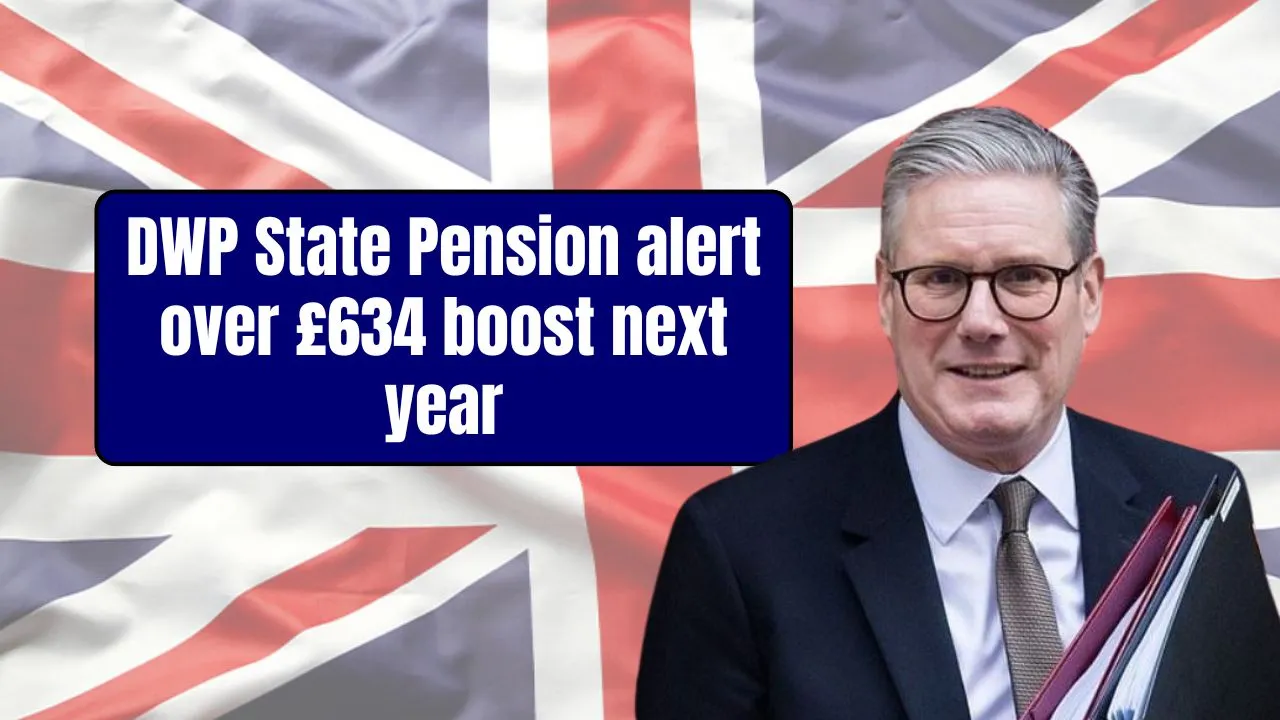£634 Boost DWP State Pension: Millions of UK pensioners could see a significant increase in their income next year thanks to a forecasted rise in the State Pension. According to recent predictions tied to the triple lock mechanism, payments are likely to go up by 5.3%, resulting in an extra £634 annually for those on the full new State Pension. This increase, set for 2026, aims to protect retirees’ buying power amidst rising inflation and wage growth. The potential boost reflects the UK government’s commitment to supporting older citizens during an era of economic uncertainty.
£634 Boost DWP State Pension
The £634 Boost DWP State Pension is based on the latest wage growth data, which currently stands at 5.3%. If this figure remains stable through September 2025, it will become the basis for calculating the 2026 State Pension increase. As per the triple lock policy, the pension rises each year by the highest of three measures: average earnings, CPI inflation, or a guaranteed 2.5%. This year, average earnings appear to be leading. If this continues, the full new State Pension will increase from £11,973 to approximately £12,607, ensuring retirees’ incomes stay in line with economic changes.
Overview Table
| Key Element | Current Rate (2025) | Forecasted 2026 Rate | Details |
| Full New State Pension | £11,973 per year | £12,607 per year | £634 boost based on 5.3% wage growth |
| Basic State Pension | £8,814 per year | £9,281 per year (est.) | Also eligible for the percentage increase |
| Triple Lock Growth Basis | 2.5% / CPI / earnings | Likely based on 5.3% wages | September 2025 final figure will determine the increase |
| Personal Allowance Threshold | £12,570 | Unchanged | Pensioners may pay tax if income exceeds this amount |
| Pension Age | 66 | Rising to 67 by 2028 | Affects when individuals can start receiving payments |
Who’s Eligible for the BOOST?
Eligibility for the £634 Boost DWP State Pension is linked to the state pension system rules:
- You must have reached State Pension age, which is currently 66.
- You need a minimum of 10 qualifying years of National Insurance (NI) contributions to receive any payment.
- To receive the full new State Pension, you need 35 years of contributions or credits.
- Those who retired under the old system may also receive an increase, although their pensions are calculated differently.
This increase is expected to apply to both the new and basic State Pension schemes, but the specific rise for additional state pension elements will be tied to inflation, not the triple lock.
Why Pensioners Might Pay Tax on Their Pension
A crucial issue to consider is the intersection between the rising State Pension and the Personal Allowance, which is currently frozen at £12,570.
With the forecasted State Pension rising to £12,607, many pensioners on the full rate could find themselves crossing the tax threshold. That means:
- Any income above £12,570 becomes taxable at 20%.
- This applies even if the income is entirely from the State Pension.
- The tax would be automatically deducted if your total income (including private pensions or part-time work) exceeds the threshold.
This marks a significant shift, as traditionally, State Pension alone kept most retirees below the tax line.
Triple Lock Explained
The triple lock is a policy mechanism introduced in 2010 to ensure pensions keep pace with the cost of living. It raises State Pension payments annually by the highest of:
- 2.5%
- Inflation (measured in September)
- Average wage growth (measured from May to July)
For 2026, wage growth is the current frontrunner, standing at 5.3%, compared to a slightly lower inflation rate. Unless there’s a sharp change in the months ahead, this wage figure will dictate next year’s increase.
What You Can Do to Maximise Retirement Income
If you’re nearing retirement or already drawing your pension, here are steps you can take to benefit the most:
- Check your National Insurance record on the GOV.UK website to ensure you have enough qualifying years.
- Consider deferring your pension. This increases your payment by roughly 1% for every nine weeks you delay.
- Apply for Pension Credit if your income is below the minimum threshold. It can top up your weekly income and unlock additional benefits.
- Make sure you’re not missing out on NI credits, especially if you’ve taken time out of work to care for children or others.
- Plan ahead for the potential tax implications of the rising State Pension.
Upcoming Pension Age Changes
Starting in May 2026, the UK government will gradually raise the State Pension age from 66 to 67. This change will affect those born between April 6, 1960, and April 5, 1977.
If you’re part of this group:
- Your State Pension start date could be delayed.
- You’ll need to adjust your retirement plans accordingly.
- Check your personal pension forecast to ensure your expected income aligns with your needs.
FAQs
1. What is the £634 Boost DWP State Pension?
It’s the expected annual increase in State Pension payments in 2026, tied to a projected 5.3% wage growth under the triple lock policy.
2. Will everyone get the full £634 increase?
Only those receiving the full new State Pension will see a £634 rise. Those on lower rates or the basic pension will see proportional increases.
3. Do I need to apply for the increase?
No. The boost will be automatically applied by the DWP if you’re eligible for State Pension.
4. Will I have to pay tax on my State Pension now?
You may, especially if your annual pension income exceeds the £12,570 personal allowance threshold. Additional income (e.g., from private pensions) increases this likelihood.
5. When will the final figures be confirmed?
The September 2025 inflation and wage data will determine the final increase and will be officially announced in Autumn 2025.
Final Thought
The £634 Boost DWP State Pension offers real financial relief to millions of pensioners, especially during a time of persistent inflation and rising living costs. But while the increase is welcome, it also brings new considerations—particularly around tax thresholds and retirement planning.
Now is the time to act: review your National Insurance record, check your eligibility for extra help like Pension Credit, and adjust your financial plans if necessary. This upcoming change could mean more money in your pocket, but being prepared will ensure you keep every penny you’re entitled to.
Call to Action:
Visit GOV.UK today to check your State Pension forecast and ensure your NI record is up to date. Share this article with friends or relatives approaching retirement—they deserve to benefit too!


